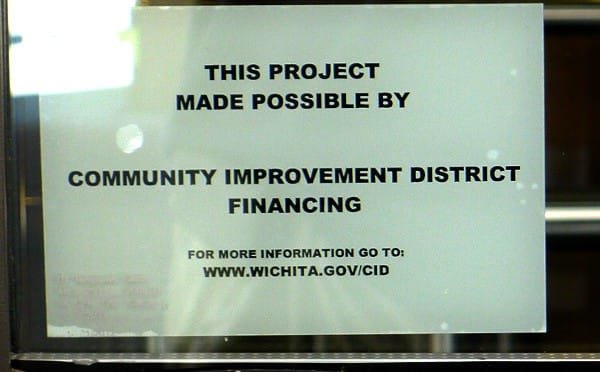Tag: Sue Schlapp
-

Education gap on Wichita City Council
Currently there is discussion in Wichita on whether higher education is valued by residents. Following, from April 2011, a look at the educational achievement of the Wichita City Council.
-

Wichita being sued, alleging improper handling of bond repayment savings
A lawsuit claims that when the City of Wichita refinanced its special assessment bonds, it should have passed on the savings to the affected taxpayers, and it did not do that.
-

In Wichita, three Community Improvement Districts to be considered
In Community Improvement Districts (CID), merchants charge additional sales tax for the benefit of the property owners, instead of the general public. Wichita may have an additional three, contributing to the problem of CID sprawl.
-

Wichita City Council fails to support informing the taxed
What does it say about Wichita’s economic development strategy that if you fully inform citizens and visitors, it renders a tool useless?
-
CID signs missing at some Wichita merchants
Not all merchants located in Wichita’s Community Improvement District program are displaying the required signage.
-
Open records again an issue in Kansas
Responses to records requests made by Kansas Policy Institute are bringing attention to shortcomings in the Kansas Open Records Act.
-
Wichita’s political class
Discussion at a Wichita City Council meeting provided an opportunity for citizens to discover the difference in the thinking of the political class and those who value limited government and capitalism.
-
Wichita City Council campaign contributions and Douglas Place/Ambassador Hotel
Making contributions to candidates for political office is part of the American political process. But for the Wichita City Council, we see a troubling trend of contributions made by people who also ask the council for money.
-
In Wichita, private tax policy on the rise
In a free society with a limited government, taxation should be restricted to being a way for government to raise funds to pay for services that all people benefit from. But in the city of Wichita, private tax policy is overtaking our city.
-
Wichita City Council bows to special interests
Yesterday’s meeting of the Wichita City Council revealed a council — except for one member — totally captured by special interests, to the point where the council, aided by city staff, used a narrow legal interpretation in order to circumvent a statutorily required public hearing process.
-
Wichita and its political class
Discussion at a Wichita City Council meeting provided an opportunity for citizens to discover the difference in the thinking of the political class and those who value limited government and capitalism.
-
Kansas and Wichita quick takes: Sunday April 10, 2011
Today: Local elections, qualifications of Wichita’s elected officials; Steineger, Kansas senator, to address Pachyderms; Washington Monument strategy; Soros conference online; economics in one lesson this Monday; Wichita City Council this week.